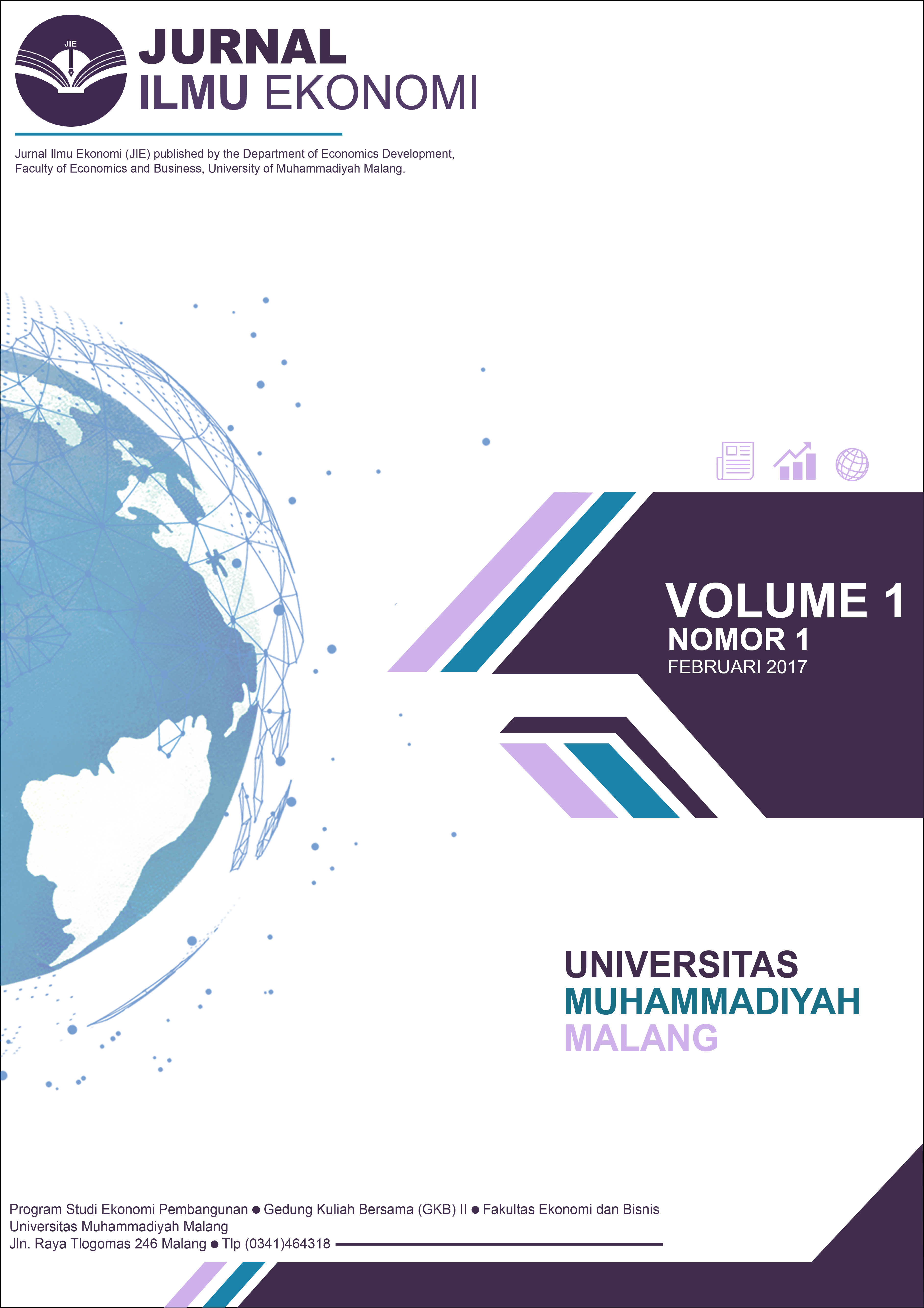ANALISIS PRODUKSI KOPI DI DESA BOCEK KECAMATAN KARANGPLOSO KABUPATEN MALANG
DOI:
https://doi.org/10.22219/jie.v1i1.6068Abstract
Abstract: This study aims to analyze the production of coffee in Bocek village – Karangploso sub-district – Malang regency in one season. The data used is primary data, primary data obtained through field interviews directly to 35 coffee farmers. The results showed that the average production of coffee in Bocek Village in one season was 6000 kg. The total cost incurred to process one hectare of coffee land in one season in Bocek Village is Rp. 35.600.700, while the total revenue received by coffee farmers in processing one hectare of coffee land of Rp. 168.000.000, so the net income received by coffee farmers in processing one hectare of coffee is Rp. 132.399.300.
Based on regression analysis, Cobb-Douglas production function model explain that LnQ = LnA + αLnK + βLnL shows variable of land area (1,369331) and labor (0,280272) in one season has significant effect to coffee production. Each 1% increase of land area will increase coffee production by 1,393%. Each labor increase of 1% will lead to an increase in coffee production by 0.282%. Statistical analysis shows the value of determination coefficient (R2) is 0.9633 and the value of the probability of F-statistic test is significant at α 5%.
Keywords: production coffee, function production cobb-douglas, land area, labor.
Downloads
References
Agung, I., Pasay, N., & Sugiharso. (2008). Teori Ekonomi Mikro Suatu Analisis Terapan Raja Grafindo Persada.
Assauri, S. (1993). Manajemen Produksi Dan Operasi. Jakarta: Lembaga Penelitian FE UI.
Boediono. (2010). Pengantar Ekonomi No 1 Ekonomi Mkro. Yogyakarta: BPFE.
Cantika. (2012). Iptek Bagi Gapoktan Jati Mulya Keluruhan Jati Mulyo Lowokwaru Kota Malang. Jurnal Ekonomi Pembangunan.
Gujarati, Damodar, & Porter, D. C. (2010). Dasar-dasar Ekonometrika. Jakarta: Salemba Empat.
Gujarati, & Porter. (2009). Dasar-dasar Ekonometrika. Jakarta: Salemba Empat.
Gujarati, Damodar, (2003), Ekonometri Dasar. Terjemahan: Sumarno Zain, Jakarta: Erlangga.
Mafor, & Ilona, K. (2015). Analisis Faktor Produksi Padi Sawah Di Desa Tompasobaru Dua Kecamatan Tompasobaru. Jurnal Universitas Samratulangi Manado.
Masyuri. (2007). Be A Real Man. Retrieved from http://www.yahoo.com
Mulyadi. (2003). Sistem Akuntansi. Yogyakarta: STIE YKPN.
Nuraini, I. (2009). Potensi dan Ketimpangan Ekonomi Antar Kecamatan Kabupaten Pasuruan. Jurnal Ekonnomi Pembangunan.
Nuraini, I. (2013). Pengantar Eknomi Mikro. Malang: UMM Press.
Ola, R., & P, F. G. (2013). Pendapatan Dan Faktor Produksi Jagung Studi Kasus Pada Usaha Tani Jagung Di Pedukuhan Sawah, Mongol, Saptori, Gunung Kidul. Jurnal Universitas Atma Jaya Yogyakarta.
Sani, A., & Masyhuri. (2010). Metodelogi Riset Sumber Daya Manusia. Malang: Maliki Press.
Soekarwati. (1990). Teori Ekonomi Produksi dengan Pokok Bahasan Analisis Cob-Douglas. Jakarta: Rajawali Pres.
Suprapto, & Edi. (2010). Analisis Faktor-faktor Yang Memepengaruhi Tani Padi Organik Di Kabupaten Seragen Universitas Sebelas Maret Surakarta, Surakarta.
, D. P. (2015, MEI). Retrieved from https://kupdf.com/embed/kabupaten-malang-dalam- angka-2016_59f0aed8e2b6f51642addbb5.html?sp=0
Downloads
How to Cite
Issue
Section
License
Authors who publish with this journal agree to the following terms:
- For all articles published in the JIE (Jurnal Ilmu Ekonomi), copyright is retained by the authors. Authors give permission to the publisher to announce the work with conditions. When the manuscript is accepted for publication, the authors agree to the automatic transfer of non-exclusive publishing rights to the publisher.
- Authors retain copyright and grant the journal right of first publication with the work simultaneously licensed under a Creative Commons Attribution-NonCommercial-ShareAlike 4.0 International License that allows others to share the work with an acknowledgement of the work's authorship and initial publication in this journal.
- Authors are able to enter into separate, additional contractual arrangements for the non-exclusive distribution of the journal's published version of the work (e.g., post it to an institutional repository or publish it in a book), with an acknowledgement of its initial publication in this journal.
- Authors are permitted and encouraged to post their work online (e.g., in institutional repositories or on their website) prior to and during the submission process, as it can lead to productive exchanges, as well as earlier and greater citation of published work (See The Effect of Open Access).
This is an open access article and licensed under a Creative Commons Attribution-NonCommercial-ShareAlike 4.0 International License








